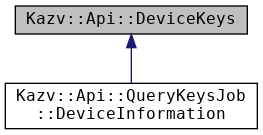Kazv::Api::DeviceKeys Struct Reference
#include <device_keys.hpp>
Inheritance diagram for Kazv::Api::DeviceKeys:

Public Attributes | |
| std::string | userId |
| The ID of the user the device belongs to. More... | |
| std::string | deviceId |
| The ID of the device these keys belong to. More... | |
| immer::array< std::string > | algorithms |
| The encryption algorithms supported by this device. More... | |
| immer::map< std::string, std::string > | keys |
| Public identity keys. More... | |
| immer::map< std::string, immer::map< std::string, std::string > > | signatures |
| Signatures for the device key object. More... | |
Detailed Description
Device identity keys.
Member Data Documentation
◆ algorithms
| immer::array<std::string> Kazv::Api::DeviceKeys::algorithms |
The encryption algorithms supported by this device.
◆ deviceId
| std::string Kazv::Api::DeviceKeys::deviceId |
The ID of the device these keys belong to.
Must match the device ID used when logging in.
◆ keys
| immer::map<std::string, std::string> Kazv::Api::DeviceKeys::keys |
Public identity keys.
The names of the properties should be in the format <algorithm>:<device_id>. The keys themselves should be encoded as specified by the key algorithm.
◆ signatures
| immer::map<std::string, immer::map<std::string, std::string> > Kazv::Api::DeviceKeys::signatures |
Signatures for the device key object.
A map from user ID, to a map from <algorithm>:<device_id> to the signature.
The signature is calculated using the process described at Signing JSON.
◆ userId
| std::string Kazv::Api::DeviceKeys::userId |
The ID of the user the device belongs to.
Must match the user ID used when logging in.
The documentation for this struct was generated from the following file:
- src/api/csapi/definitions/device_keys.hpp